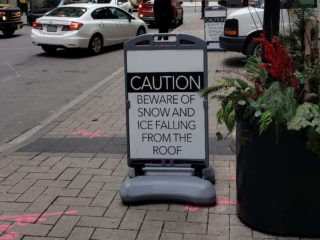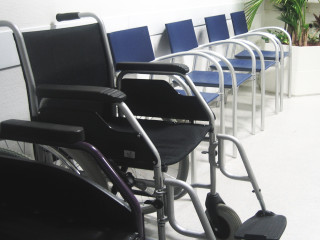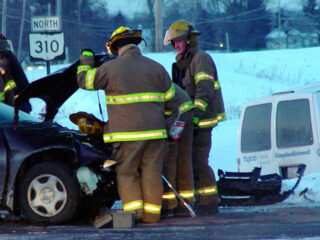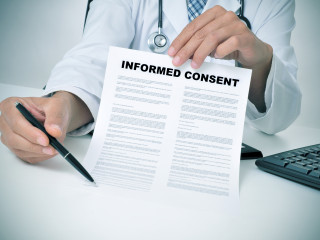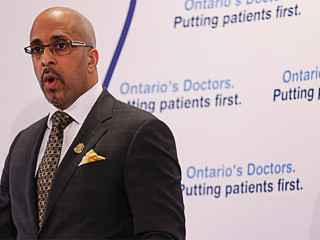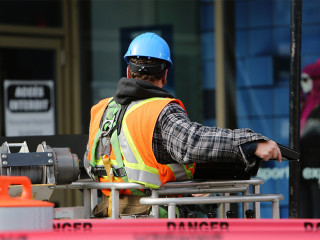In November 2017, J.E. was walking on a sidewalk in Waterloo when he was injured by a bus stop sign that was protruding into his path. He claimed damages for injuries including concussion, depression and anxiety. In 2023, J.E. was subsequently hospitalized, diagnosed with and treated for schizophrenia. [1]
The defendant, Metrolinx, brought a motion for an order requiring the injured plaintiff to attend a 3-hour in-person assessment with a psychiatrist. Metrolinx expressed concern about its ability to respond at trial to the evidence of the many psychiatric professionals treating J.E. for schizophrenia.
J.E. refused to attend the in-person assessment. Several months prior, that same psychiatrist had prepared a report based on document review. J.E. had also attended an earlier in-person defence neuropsychological assessment and had agreed to attend a follow-up neuropsychological assessment. The request for J.E. to be examined by the psychiatrist fell within the category of “multiple defence examinations.”
The outcome of the motion turned on (a) the case to which the defendant was required to respond; (b) the role of a participant expert at trial; and (c) the nature and the quality of the evidence filed in support of the motion.
The substantive issue to be determined was whether Metrolinx has established that J.E.’s attendance for an in-person assessment with psychiatrist Dr. Gavett-Liu was necessary to “level the playing field” and ensure the proceedings were fair.
Justice Corthorn dismissed Metrolinx’s motion. Metrolinx had not established that the in-person psychiatric assessment was necessary to permit it to respond to the allegations of the statement of claim, and the records and reports served by the plaintiffs.
The Law
Where a plaintiff raises his physical or mental condition as a question in the proceeding, the court has discretion under s.105(2) of the Courts of Justice Act to order they undergo a medical examination by one or more health practitioners. Such an examination is part of the discovery process.
The following principles guide the evidence that the moving party must present to establish why the proposed examination is necessary to level the playing field: [2]
- The evidence in support of the requested examination must be “clear and compelling;”
- The moving party must make “some effort to demonstrate why an examination by [the] particular specialist is needed;” and
- At a minimum, “the evidence must explain why the particular examination is required” [3]
The Court should also consider not only the fairness of the proceeding, but delay in and costs of litigation. [4]
Analysis
The case to which Metrolinx was called upon to respond included, (a) the allegations in the statement of claim; (b) the contents of the records and reports from the treating healthcare professionals; and (c) the contents of the experts’ reports served on behalf of the plaintiffs.
i. The pleadings
The statement of claim when read together with the Metrolinx pleading did not collectively support a conclusion that an in-person assessment was necessary for Metrolinx to respond to the case. The statement of claim made no mention of J.E’s hospitalization in 2023 or his diagnosis of schizophrenia, nor did the plaintiffs have any intention to amend their pleadings to include it.
ii. The documents produced
The plaintiffs produced J.E.’s hospital records showing his admission to the hospital in 2023 for schizophrenia. They had never served an expert report prepared by a psychiatrist, neuropsychologist or any other healthcare professional J.E. had seen in relation to his schizophrenia diagnosis or other psychiatric conditions. If the plaintiffs were to call one of J.E.’s healthcare professionals at trial, it would be in their capacity as a participant expert.
Metrolinx provided no evidence to suggest the in-person assessment stemmed from any other records other than those from the hospital from January 2023 forward.
iii. Expert reports
The case to which Metrolinx would be called upon to respond would include an expert report from psychologist and neuropsychologist, Dr. Lad, to be obtained by the plaintiffs. In his affidavit, Dr. Lad stated that he intended to re-assess J.E. and address the diagnoses J.E. received in 2023, the etiology of those conditions, and how those conditions may be affecting J.E.
There was no evidence that the plaintiffs intended to retain a psychiatrist as a litigation expert to prepare either a paper review report or examination-based report, addressing the issues that Dr. Lad anticipated he would address in his report.
Participant Experts
Justice Corthorn noted that if J.E.’s health care professionals from the hospital were called to give evidence, it would be in their capacity as “participant” experts. The court reviewed the existing law on participant experts and what it means to be a participant expert.
The basis for the request from Metrolinx for the in-person assessment was summarized as being its concern for its ability to defend any evidence presented at trial by J.E.’s treating psychiatrists, and that consequently, Metrolinx would need its own opinion from a psychiatrist.
Neither the affidavit filed on the motion by the Metrolinx lawyer or their neuropsychologist, Dr. Gow, identified any contents in the records that would give rise to Metrolinx’s concern about its inability to respond to the case. They did not support any finding that any one of the treating healthcare professionals had expressed an opinion about the possible contribution of the November 2017 incident to J.E.’s presentation and/or his psychiatric condition from January 2023 forward.
The psychiatrist in her document review report referred to “comments” that J.E.’s treating healthcare professionals had made in the records about the possibility that J.E.’s prior traumatic brain injury contributed to his presentation as of January 2023. Justice Corthorn noted that these “comments” in the records were not guaranteed admission into evidence at trial, and that it would be up the trial judge to exercise their gatekeeper function at trial with respect to any such comments.
The Metrolinx psychiatry report
Metrolinx did not file an affidavit from their expert psychiatrist and the psychiatrist did not indicate in her report that an in-person assessment was necessary in order to respond to the contents of J.E.’s hospital records. She did not place any caveat on her opinions, or state that she was hindered in responding to the referral questions because she did not have the opportunity to assess J.E. in person.
The reason given by the psychiatrist for her strong recommendation that an in-person assessment be conducted was to “adequately assess psychiatric symptoms”. She did not suggest that the in-person assessment was strongly recommended let alone necessary, to permit her to address the issue of causation of the post-incident psychiatric symptoms, or to otherwise respond to the anticipated evidence of the treating healthcare professionals.
None of the documents filed supported the conclusion that such an assessment was necessary for Metrolinx to know the case it had to meet.
Evidence of the opposing neuropsychologists
In their respective affidavits, for the most part, both neuropsychologists Drs Gow and Lad agreed to the scope of practice of neuropsychologists, and that they were qualified to make diagnoses citing the DSM-5, which includes schizophrenia. Dr. Gow stated that the fields of psychiatry and psychology are complementary and collegial, but that medical/pharmacological aspects of presentation fall within the expertise of a psychiatrist.
However, neither doctor provided any evidence identifying any potential “medical/pharmacological aspects” of J.E.’s presentation as recorded by the treating health professionals, “relevant to a formulation and differential diagnosis in schizophrenia.” There was no evidence from either that supported a conclusion that it was necessary for the psychiatrist to conduct an in-person assessment to address medical/pharmacological aspects of J.E.’s presentation.
Neither of their evidence supported a conclusion that an in-person psychiatric assessment was necessary to permit Metrolinx to know the case it had to meet.
The playing field did not require levelling
The Metrolinx lawyer’s affidavit stated that without a responding psychiatric opinion, Metrolinx was not able to provide any psychiatric evidence on this “central issue” in the litigation. Metrolinx did not identify any specific entries in the hospital records that gave rise to a concern that any one of the treating healthcare professionals had expressed an opinion, let alone would be permitted by the court to give opinion evidence outside the scope of their respective roles as participant experts.
It was unclear to the court how the playing field here was unlevel. Justice Corthorn noted that if the playing field was in any way unlevel, it was in favour of the plaintiffs, who of their own choosing, did not have a litigation expert to match the precise area of expertise of Metrolinx’s psychiatrist.
The number of treating psychiatrists that J.E. had seen was not in and of itself sufficient to create an unlevel playing field in the proceeding. There is no property in the treating professionals as witnesses. Metrolinx could call any one of them as witness at trial. It would be up to the trial judge to exercise their gatekeeper function with regard to the number of participant experts the plaintiffs would be entitled to call, and the substance of their evidence.
[1] J.E. and S.E. v. Metrolinx and Boca Construction Ltd., 2024 ONSC 784 [2] Nelson v. Thiruchelvam (2005), 21 C.C.L.I. (4th) 115 (Ont. S.C.), at paras. 21-22 [3] Abergel v. Hyundai Auto Canada (2002), 43 C.C.L.I. (3d) 241 (Ont. S.C.) [4] Nelson at para 25